Victim of Chechnya’s gay purge says he was beaten in blood soaked cell
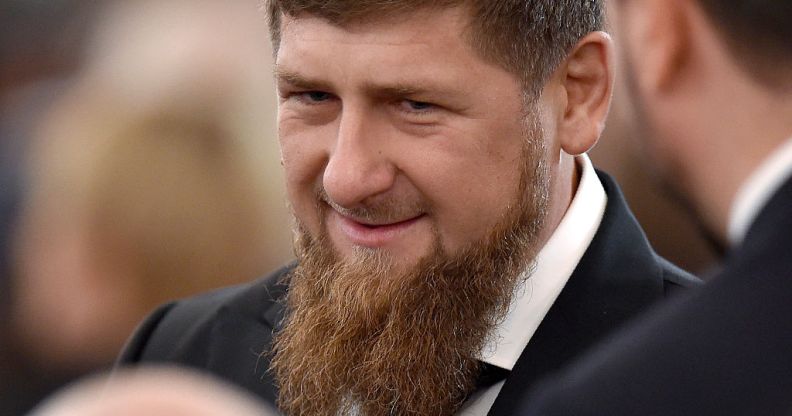
Chechnya’s leader Ramzan Kadyrov (Getty)
A new victim of Chechnya’s shocking ‘gay purge’ has come forward.
Maxim Lapunov has described being held for 12 days in a blood-soaked cell, beaten with sticks and humiliated by police.
The 30-year-old says he was grabbed by two men in the middle of the night and dragged into the back of car.
Despite reporting his lengthy ordeal to authorities, Mr Lapunov says there has been no investigation into what happened.
Instead police forced him to name another man, interrogated and beat him.
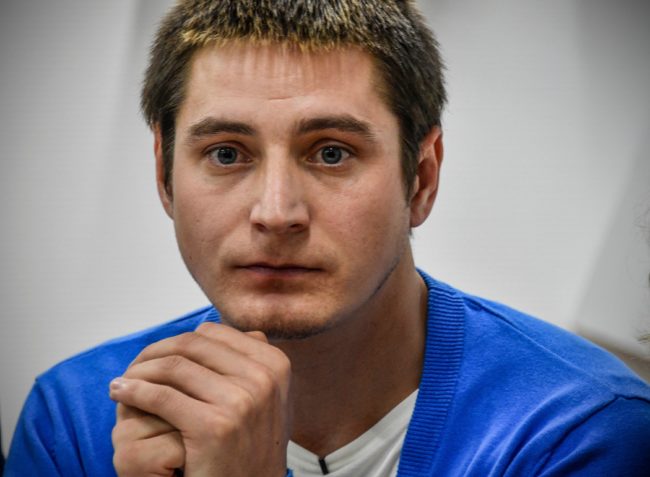
Openly gay Maxim Lapunov, 30, gives a press conference in Moscow on October 16
“They burst in every 10 or 15 minutes shouting that I was gay and they would kill me,” he said, speaking at a small gathering in Moscow convened by human rights activists reported by the BBC.
“Then they beat me with a stick for a long time: in the legs, ribs, buttocks and back. When I started to fall, they pulled me up and carried on,” he said quietly.
“Every day they assured me they would kill me, and told me how.”
The news of “gay concentration camps” in the republic of Chechnya first reached the international press in April 2017.
It was reported that gay and bi men had been rounded up in a “purge” and were being abused, tortured and killed in the camps.
Despite international pressure, the report says that the camps are still in operation, and that it is likely dozens of men have been killed.
Mr Lapunov says he was barely able to walk by the time police let him go.
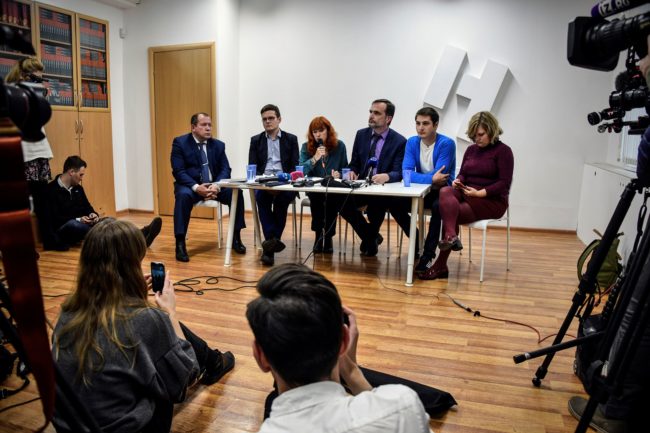
Openly gay Maxim Lapunov (2nd R), 30, along with human rights and gay rights activists
“I could barely crawl when I left,” he told the human rights gathering, adding that the groans and screams of other detainees continue to give him nightmares.
“It should not be like this. We are all people. We all have rights,” he said.
“If those rights can be violated [in Chechnya], it could happen in any region. And no-one knows whose son or daughter will be next.”
Related: Everything you need to know about Chechnya
The Russian LGBT Network has published reports of numerous testimonies from people who have experienced persecution and abuse in Chechnya.
They have been collecting the stories as they work to help people in Chechnya who have been subject to brutal abuse because of their sexuality
Despite the testimonies, Chechen president Ramzan Kadyrov dismissed them as “nonsense” invented by “devils” and claims there are “no gays” in the state.
The Russian LGBT Network launched a 24-hour hotline for those being persecuted in Chechnya, trying to assist them where possible, and has been able to help evacuate over 60 victims from the region.
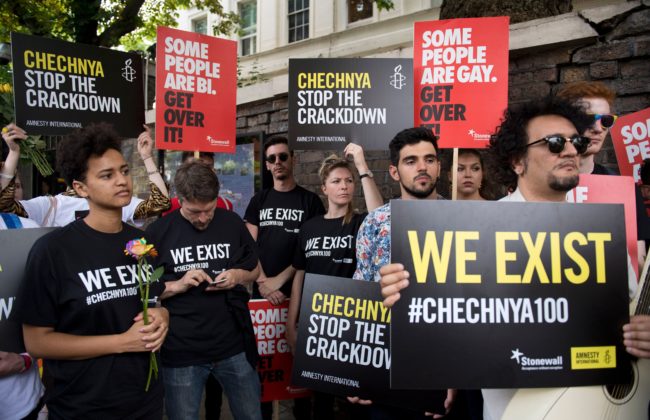
(Photo by JUSTIN TALLIS/AFP/Getty Images)
Before 2017, the LGBT Network said there were a number of cases from people who said their sexuality was used as a reason to abuse them and extort money from them.
One victim said: “They pulled me out of the car. Took off my clothes. My shirt, jeans, even my underwear.
“They themselves started to undress me. The one who was driving filmed all of it; the others just beat me.
“They did this to get money from me.”
But in 2017, these attacks became more focused, with police often using the justification of ‘random drug searches’ to target men they thought might be gay.
One man reported that his car was raided by the police for drugs. They saw he was wearing bracelets and had a bag containing toiletries and a manicure set, which was enough to make him a target.
They asked him: “Are you a faggot? If you are, I’ll shoot you right here.”
The report said the attackers were often driven by an ideology of “purification of the nation.”
One man said: “They openly told us: ‘You were brought here because you are faggots.
“‘You bring shame on our people; you shouldn’t exist. We will catch all of you.
“‘We will fight homosexuality in the Chechen Republic.'”
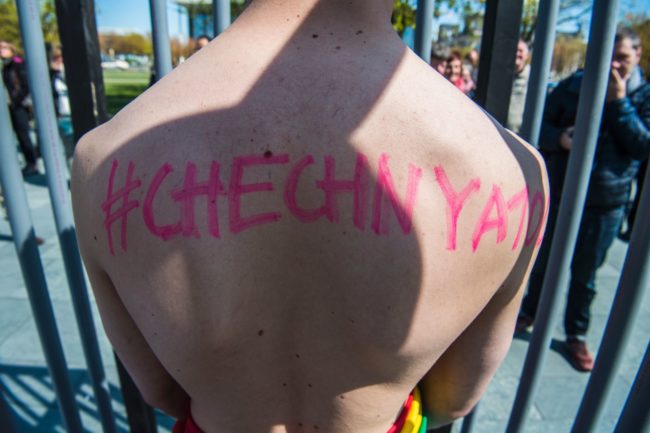
Berliner protesting the gay purge in Chechnya (John MACDOUGALL (Photo credit should read JOHN MACDOUGALL/AFP/Getty Images)
Another source said: “They threw me to the floor and beat me.
“They beat my chest and my face with their feet, and they hit my head against the floor.
“One of them said: ‘Do not beat him until the shock stage, at that point he will stop feeling pain. We don’t need that.’
“They addressed me with female pronouns and demanded that I tell them the names of other gay people I knew. They threatened to kill me if I didn’t.”
The report says that the first wave of attacks, which they pinpoint as beginning in December 2016, started when a man known as W was arrested and evidence of his homosexuality was found on his phone.
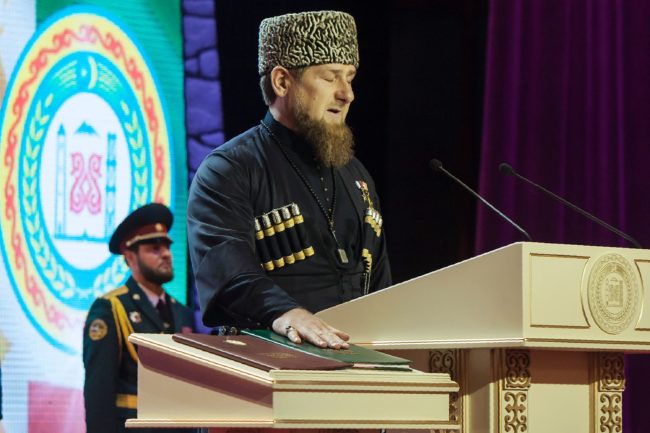
Ramzan Kadyrov takes an oath (AFP / ELENA FITKULINA)
He was forced to give up names of other gay and bi men in Chechnya, who then became hate crime victims.
This began a pattern where the police would use the phones of men they had already caught to contact others. They would trick them into attending a meeting, at which the victims would be detained and incarcerated.
One man described how he received a phone call from a friend and went to meet him, but realised when he arrived that it was a set-up.
“The people who were with him were wearing camouflage uniforms. They said that they were taking me away. They started beating me up and saying humiliating things,” he recalled.
“They said that I’m not a man, just some creature, that I am nothing. That I should rather be a terrorist than a faggot. That a dirty piece of cloth was worth more than me.”
Some of the testimonies are even more horrific, describing in detail the physical abuse the men faced.
One source said: “They caught a guy, and he allegedly had contacts with terrorists. They brought in a hollow tube and a barbed wire.
“They put a tube inside of him. In his anus. Then, they put the barbed wire inside this tube. Then they took the tube out. And then they were slowly pulling the barbed wire out.
“We were led out into the hallway and chained to the power unit. We just sat on the cold floor all night long. Everyone passing by kicked us, spat on us, and insulted us,” one source said.
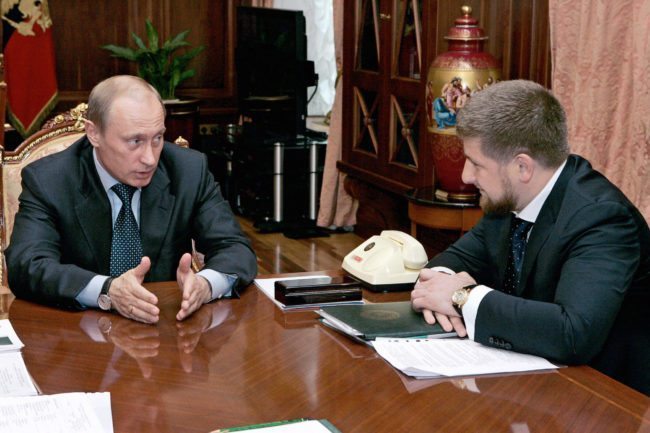
Russian President Vladimir Putin with Chechen leader Ramzan Kadyrov (Getty)
“The militants beat me using pipes, aiming below the waist: the hips and the buttocks. And from time to time, I was tortured with electric current. They used a casket with wires that had tweezers at the end.
“They attached those tweezers to my body. They laughed when I cried.”
Victims had no idea how long the detention would last, with some being held for as long as a month, and at least three people attempting suicide.
When released, the men were told that they could not flee Chechnya as their movements would be monitored.
They were also forced to take part in a “ceremonial shaming,” with families being told that if they murdered their “shameful” family member in an honour killing they would not be prosecuted.

